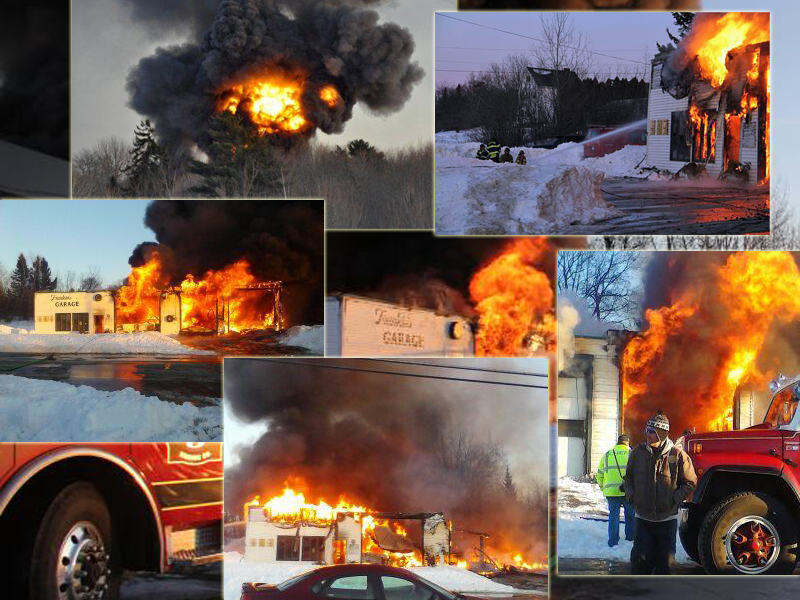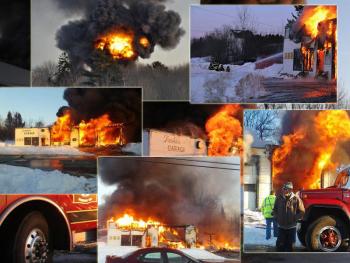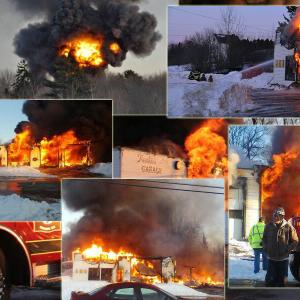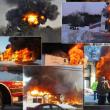Owner of Frankie's Garage claims Owls Head fire chief failed to battle blaze as ‘payback’
ROCKLAND — Cecil Fogg of Owls Head filed a civil lawsuit in Knox County Superior Court Feb. 9, naming the town of Owls Head, the Owls Head Volunteer Fire Company and Frank Ross, the fire department's chief, as defendants, claiming the department was negligent, did not adequately prepare for or combat the fire and that the fire chief "held a grudge" against the plaintiff.
Fogg's business, Frankie's Garage, burned to the ground Feb. 10, 2013. Vehicles and motorcycles, as well as oil barrels, were stored in the garage on Route 73. The flames and heat caused numerous explosions inside the building, sending smoke and flames high in the air and visible for miles around.
Three days after the fire, Maine State Fire Marshal's Office investigators Kenneth MacMaster and Mary-Ann MacMaster attributed the fire to a malfunctioning waste oil burner. On that day, Fogg was quoted saying that waste oil burners are "a good idea, but they can be problematic," given the different mixes of fuel that feed them.
The fire started small, according to a witness Feb. 10, 2013, who lived across the street, and said she noticed "6-inch-high flames" coming from the building, from the oil furnace, and yelled to her boyfriend to call 911.
Also on the afternoon of the fire, Ross said that the fire "quickly evolved in the old wood-frame" building. Approximately 45 firefighters and eight trucks from four neighboring towns, including Owls Head, Rockland, St. George and South Thomaston, rushed to the scene.
While the barrels of waste oil, which was burned in the oil furnace to heat the building, exploded inside and caught trees outside on fire, firefighters were successful in removing oxy-acetylene torches used for cutting and welding from the garage before they too exploded.
"Cutting gases are one of our biggest concerns," said Ross at the scene of the fire in 2013.
In the lawsuit, Fogg claims he had more than $300,000 in equipment, tools, vehicle parts and related business items housed in the repair shop. He also claimed he had a number of classic vehicles and motorcycles inside, valued at another $100,000.
At the time of the fire, Fogg said in the lawsuit, the fire was contained to a waste oil furnace.
"As the fire was located in Owls Head, Ross, as chief, was in command and made decisions as to how firefighting resources were to be deployed in fighting the fire, including those of mutual aid responders," said Ross in the court document. "Ross and the firefighters under his command failed to adequately plan and prepare for a fire at this location."
Fogg claimed that the Owls Head firefighters failed to arrive at the fire scene with the proper equipment to "tap into the hydrants nearest to the fire"; that Ross was not in his turnout gear for the fire; that Ross went into the building with no fire gear on; and that mutual aid responders allowed the Owls Head Fire Department to utilize their equipment.
"Ross, after inspecting the inside of the building, left the building and in the process left the front door of the building open allowing the fire to become further oxygenated and advance more quickly," said Fogg in the court document.
Fogg claims that Ross failed to provide instruction to his firefighters or the mutual aid commanders as to how best to battle the blaze, and that Ross "incorrectly stated" that the fire could not be fought and "prematurely told his firefighters and mutual aid responders to stand down and not deploy resources to combat the blaze."
"Very early on in the fire, Ross advised his firefighters along with the chiefs of mutual aid responders that the building was going to be a loss and that they should not attempt to save the building," said Fogg in the court document.
Fogg claims that Ross "refused" to set up a dunk [sic] tank on the north side of the fire, despite the "availability and practicality" of same, and that he "refused" to deploy spray foam to combat the fire, despite the "availability and efficacy of same."
Despite Ross' command status, and statements that the building was a total loss, Fogg said mutual aid responders stepped in and "began the fight the blaze without Ross' assistance or that of his department and were making progress in containing the fire."
He also said that mutual aid responders "did their best" to set up a dump tank, to hold water delivered from another source, on the south side of the building and began pumping water from a nearby pond and delivering it the holding tank for use by the engines stationed on scene.
"After the fire had run its course, Ross ordered an excavator to destroy the remains of the building before the fire could be investigated by the State of Maine Office of the Fire Marshall," said Fogg in the court document.
Fogg also claims that Ross subsequently authored multiple reports regarding the fire that were "internally inconsistent and inconsistent with the facts on the ground as they occurred."
Following his statements and allegations about the fire and his allegations about Ross' failures to properly handle the call, Fogg stated in the court document that in 1996, the two men were involved in a motor vehicle accident. And Fogg claims he was unaware that Ross "held a grudge for the accident over many years."
"Later, as they were looking over the remains of the fire, Ross walked by Fogg and told Fogg 'this is for the accident,'" said Ross in the court document.
As a result of the fire, Fogg and his company suffered damages and losses in excess of $400,000.
Fogg is suing for negligence, for breaching their duties by wrongfully "acting in a manner that frustrated efforts to fight the fire" and by failing "to prepare a plan and institute the plan in a reasonably skilled manner" to combat the fire to save Fogg's property.
Fogg also claims that Ross acted with "malice" toward him, in regards to the fire, and that the defendant's wrongful conduct was the "factual and legal cause for the losses and damages" he sustained.
In addition to seeking damages, in an amount to be determined at trail, Fogg is seeking punitive damages, attorney's fees and costs and any other relief granted by the court.
Fogg is represented by attorneys Darby C. Urey and Patrick J. Mellor, of the Rockland firm Strout & Payson, P.A. According to early reports, the garage was insured and since the fire, it has been rebuilt.
Related stories:
• UPDATED: Owls Head garage destroyed in Sunday afternoon fire (Posted Feb. 10, 2013)
• Fire marshal investigators determine cause of Owls Head garage fire (Posted Feb. 13, 2013)
• Letter to the editor: A thank-you from Frankie's Garage (Posted March 19, 2013)
Opinion: How the fire at Frankie's Garage was fought
• Frank Ross: Anatomy of a fire (Posted July 11, 2013)
Reach Editorial Director Holly S. Edwards at hollyedwards@penbaypilot.com
Event Date
Address
50 Weskeag Road
Owls Head, ME
United States





























